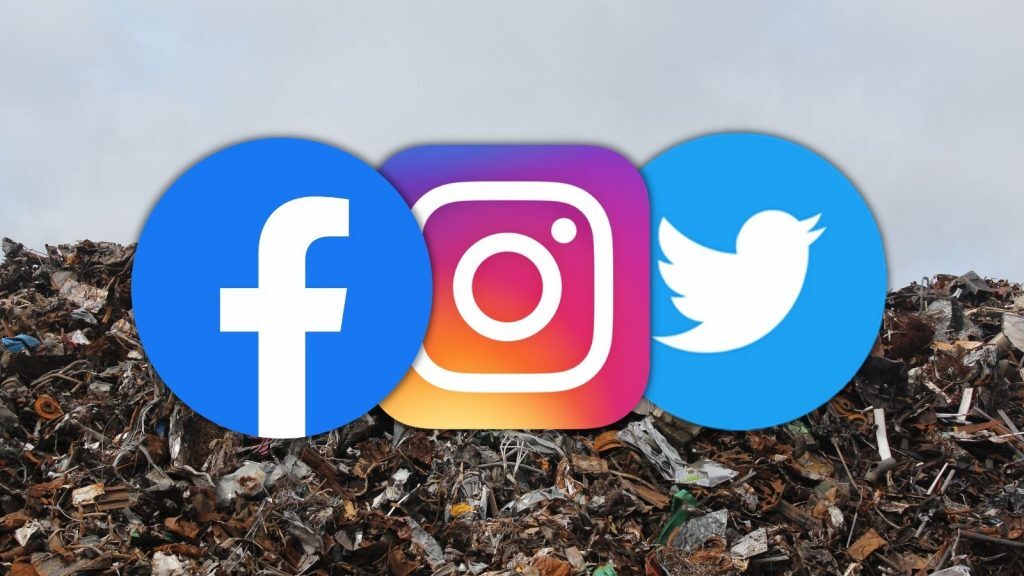One of the most powerful tools of the information age (no, not Mark Zuckerberg — he’s merely a powerful tool) is social media. But, like any tool that was developed with no idea what it might one day become, it is inherently broken.
It’s broken because it claims to be a specific thing — a place where speech can be heard — but it’s incapable of delivering on that claim. Because, at its heart, social media is really about two things. Neither of them is speech. It’s all about data and profit. One leads to the other, but both rely on the speech of users to come into being.
You’ll notice that neither item requires that everyone has a voice. Just enough voices to convert pithy missives into money for shareholders and investors. This is a problem, and it’s far from the only issue faced by social media. You see, people routinely say horrible things on Twitter and Facebook. Sometimes it gets them elected president of the United States of America. Sometimes it gets them banned from those platforms (and others). Sometimes they’re the same person.
Not for everyone
 Which isn’t really a problem as long as you realise what social media platforms really are. They’re private playgrounds where the only voices allowed are the ones that its creators like. Facebook, Twitter and friends don’t like to advertise that bit but you can only stick around as long as they’re okay with what you’re saying. And, generally, they’re fine with what you’re saying as long as you’re not costing them money. The moment the bottom line comes under threat, you’re out of there.
Which isn’t really a problem as long as you realise what social media platforms really are. They’re private playgrounds where the only voices allowed are the ones that its creators like. Facebook, Twitter and friends don’t like to advertise that bit but you can only stick around as long as they’re okay with what you’re saying. And, generally, they’re fine with what you’re saying as long as you’re not costing them money. The moment the bottom line comes under threat, you’re out of there.
Which is weird, because these platforms are designed to amplify controversial opinions. And ‘controversial’, in this case frequently means ‘rank stupidity’ — the rise of QAnon, the flat-Earth movement and anti-vax points of view would have been impossible without social media algorithms giving preference to ‘controversial’ content. Platforms are now working against themselves, attempting to downrank so-called harmful misinformation while keeping the misinformation that still does well but doesn’t hurt anyone. Computers… don’t know how to decide that.
Get outta here
Part of the efforts to maintain profit margins improve the experience for users involves kicking off some of its less savoury participants. This is immensely stupid if you care about speech at all, but it’s also silly because these moves are giving governments the ammunition needed to target and attempt to control this immensely powerful force that is — in theory — in the hands of the average person.
See, when Twitter was only kicking off Republican supporters issuing death threats or terrorists attempting to recruit suicide bombers, nobody was all that upset. Besides those being kicked off were committing illegal acts. But social media’s flaws have been exposed. It turns out that, if you’re a large enough douche canoe, all you need to do is offend the right people and the algorithms will do the rest of the work for you. But social media users now feel they shouldn’t have to be exposed to this. This has led to the takedown of voices — often unpleasant, stupid, racist or otherwise objectionable voices, true — that really should not be excluded from the conversation.
Because you need these people on Twitter. You need them on Facebook. They exist. They’re not going anywhere. Banning them doesn’t make them disappear. We’re all trapped on this planet together. And you need these voices because a) they tell you what you are not and b) they challenge your ideas if you’re actually listening to them instead of trying to shut them out.
To use a local example, the EFF’s Julius Malema is an expert at using the nature of social media to elevate ideas. Many of the claims made by the EFF are cynical shock tactics, done for the attention (a point of view that isn’t shared with the EFF’s rank and file — another problem to be laid at the door of social media). But they’ve also got legitimate grievances with the way that South Africa as a country is run. It pays to pay attention to them, to find the common ground that exists there. There’s no need to agree on everything, but chances are there’s something. You could also block them on all channels, but you’re denying yourself the chance to learn something about yourself if you do.
Sights set on social media
 But here’s the big problem. Governments have also worked out just how powerful social media platforms are, and the wounds the most powerful of these are toting around have got governments sniffing around for more blood. The Nigerian government just blocked Twitter in that country for deleting one of the Nigerian president’s tweets that called for violence against his own citizens. Was Twitter justified? Maybe. Is Nigeria going to use the incident to attempt to exert control over the platform? Definitely.
But here’s the big problem. Governments have also worked out just how powerful social media platforms are, and the wounds the most powerful of these are toting around have got governments sniffing around for more blood. The Nigerian government just blocked Twitter in that country for deleting one of the Nigerian president’s tweets that called for violence against his own citizens. Was Twitter justified? Maybe. Is Nigeria going to use the incident to attempt to exert control over the platform? Definitely.
India’s government has made significant attempts to control what social media — which, remember, is powered (in theory) by the voices of its citizens — can do in that country. Part of those attempts is to mandate that platforms maintain a local presence. That’s not just so there’s someone to interface with local authorities, it’s also so that the government has leverage — someone to arrest in the event something happens on the internet that they don’t like.
Australia’s recent ban on posting by Facebook, the deplatforming of Donald Trump, the removal of special concessions for politicians online — these events will be used by the government in an attempt to take control from the private companies running these platforms and turn social media to their own ends. Worse, as long as these private companies can continue making money, they’ll probably go along with it. The deference to China’s demands by… pretty much everyone is evidence of that. They’ve got loads of money, and everyone wants some of it. Of course all and sundry will agree to that country’s government’s demands.
Why you need to keep the people you dislike online
Right-wing dipshits love to cite versions of the poem by Martin Niemöller, called ‘First they came…‘, to protest their (often justified) removal from various internet platforms. They also famously don’t care if the same things happen to others who aren’t like them while in their own personal playgrounds. But, in this case, they have a point. Blindly removing voices you don’t like will inevitably lead to your own voice being silenced.
Because governments are using the current tide of dissent against unpleasant or unwanted voices to slip their hooks into various social media platforms. The first thing totalitarian governments do when things aren’t going their way is to suspend access to social media. It’s happened in Nigeria, mainland China, Hong Kong, Pakistan, Uganda and other countries. And each instance is an attempt to stop citizens from voicing disapproval towards the way things are being run. Giving governments more control over social media will not fix these platforms. What it will do is give those governments more control over their populations and give those populations less control over who governs them — and that’s never been a good thing.
Solutions?
So what’s the answer? The short answer is: There isn’t one. Not the way things stand. It’s only really possible to say what the answer isn’t. Government control over social media, a force that — much like nuclear power — can be used to good or for ill, is not the answer. It’s too powerful to sit in the hands of governments.
It’s also too powerful to reside in the hands of those that created it. Mark Zuckerberg and Jack Dorsey (there are many more, but you get the point) should not have their hands on the reigns of the most powerful information engine in the history of mankind. Social media should not be used as a data-collection tool. It should not be driven by algorithms and it most definitely should not be monetised. Those functions are all ripe for abuse by those with money and power who want more money and power.
The only way social media works is the way people are supposed to work. Discussions. Disagreements. People you like. People you don’t like. More voices mingling, without an algorithm deciding that this particular brand of stupidity is more important than that brand of intelligence, simply because more people are talking about the stupidity. Mankind is not supposed to be a for-profit enterprise, and nor should the places we meet every day to discuss the state of the world and the state of our cats.
Maybe we’ll never get there. But ceding control over these for-profit platforms to governments, just because we don’t like what some people on those platforms are saying, only has one outcome: less freedom for everyone. Not just the people we don’t agree with.




